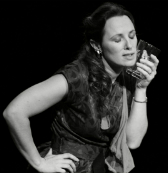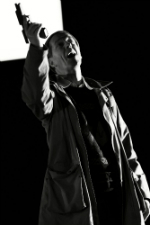During the years of the Troubles, the green and pleasant lands of County Fermanagh suffered a high number of casualties. This beautiful, ostensibly peaceful rural landscape conceals a multitude of tragedies, many of them inflicted upon good-living, Protestant families, who have worked these fertile pastures for generations. In the 1980s, Jennifer Johnston directed her compassionate dramatic vision onto these innocent victims of paramilitary violence and wrote a pair of monologues about a middle-aged farming couple, Billy and Christine Maltseed. Several years later, she wrote a companion piece, Twinkletoes, this time set in Derry but tracing chilling connections back to the home place of Christine and Billy.
These rarely performed pieces have been revived by The Playhouse and presented as a trilogy for Derry-Londonderry UK City of Culture 2013. It proves to be an intense, intriguing evening of quiet drama and sombre reflection, of dry humour and old fashioned values: a satisfying opportunity to showcase three exquisitely constructed but lesser known dramatic works by one of Ireland's most accomplished living writers. Director Caitríona McLaughlin gives time and air to all three, holding them together as a complete unit with only a brief 10-minute break between each one. There is scant opportunity for flagging concentration. Conversations and observations, which arise naturally during the intervals, bleed chillingly into the next play, like frostbite moving through the body. McLaughlin has opted for the same plain black box performance space and minimal staging for all three stories. The only focal diversion comes via rectangular cut-outs high in the back wall, their function shifting and reforming with each piece.
An absorbing, sometimes disturbing sense of silence inhabits each scenario – first, the oppressive silence of a house now occupied by a single, troubled soul; next, the silence of a home stripped of the life of one family and about to pass into the hands of another; finally, the silence of the countryside, broken only by the snapping of twigs and the rush of birds in flight.
McLaughlin has opted to run the pieces in reverse chronological order, beginning with Twinkletoes. This is clearly a considered decision on her part, but one can't help feeling that this would have been the more affecting piece with which to end, rather than with Billy's story, to which only the audience knows the final outcome. But even as it stands, the long, slow burn of realisation continues hours after the lights go down. The sensation of foreboding lingers on, half-truths trickle slowly into the consciousness and time passes before the final pieces in an incomplete Rubik's cube click horribly into place.
Helen Behan has the unenviable task not only of opening proceedings but of keeping up the appearance of a legless drunk throughout the 45-minute piece. She is Karen, the 'Twinkletoes' of the title, an affectionate nickname given by her father, a former Royal Navy seaman. As a younger woman, Karen loved to dance and enjoy herself. She fell in love with Declan, a former car mechanic, who charmed her and whom she still admits to loving to bits. They have a 17-year-old daughter Noreen. So far, so happy families. But now Karen lives alone. Declan is in prison, serving three concurrent life sentences, and Noreen has just married the father of her unplanned child.
Karen staggers into our company in the immediate aftermath of the wedding, wearing an odd concoction of smart and everyday clothes. Her cheap new shoes are killing her and she is dying for a drink … then another drink … and another. Like many alcoholics, she is secretive in her actions, but fails to notice a pair of eyes watching unflinchingly through the cut-out windows in the set, blinking randomly and refocusing like the turning of a kaleidoscope.
For the past seven years, her marriage has been conducted across a prison table. Johnston creates a complex, multi-faceted portrait of a life in crisis, a woman who has had to endure public disapproval and personal disintegration while her husband follows an established routine behind bars. Behan brings genuine sincerity to the pathos and desperation of Karen's situation but is not entirely successful in delivering the black humour and sardonic self-awareness that, aside from a hidden stash of booze, are her only means of survival.
It is a woman far removed from Karen who walks on stage as the eponymous central character of Christine. In appearance, in dress and demeanour, Christine Maltseed is an upright woman, recently widowed and about to move out of the farmhouse which has been in her husband's family for many years. The blank screens in the cut-out spaces are as empty as the kitchen in which she stands. The Orange Order, the Presbyterian church, the farm, familial duty, the Protestant work ethic – these have been the cornerstones of her married life. But one basic element is missing: a child. Christine has never had the heart to tell her kind but deeply orthodox husband Billy that the cause of their infertile marriage lies with him.
Gina Moxley applies faultless instinct and delicacy of touch to her portrayal of a woman, who is not all she seems. Beneath Christine's neat, plainly-dressed exterior beats the heart of a closet rebel, aching to break free of her shackled existence and strike out independently. Eschewing local convention, her best friend is a Catholic, whose noisy children provide her with hours of pleasure and longing. Moxley is in total control of her resilient character, as she speaks calmly of the murder of her husband, and the death of his father in the immediate aftermath. A ripple of sorrow fills the auditorium as she describes preparing their two coffins, placing an Orange sash into each.
Side by side stand two exemplary pieces of writing and acting, with Johnston effortlessly capturing the nuanced existence of womanhood and family life on one side of the community of this isolated area. And Moxley slips so unobtrusively into the role that it is hard to believe that Christine is anything but a real person, tuning unerringly into Johnston's subtle and fascinating examination of northern Protestantism.
It is left to Pat Lynch in Mustn't Forget High Noon to complete the trilogy as Billy Maltseed, farmer, husband, Orangeman, pillar of the community - but never a father. He rues working the farm alone, with no son to accompany or follow him. Only the great flocks of wintering birds swooping across the little cut-out screens see his pain. Since they were kids, Billy and his pal Sammy loved going to the pictures. Their favourite movie was High Noon. They would spin imaginary guns and take shots at each other, swaggering around, singing "do not forsake me, oh my darling." Now the guns are real and the song lingers on. Billy sings it as he tends his hedges. He sings it to cover his regret that Christine is, as he believes it, 'barren'. He sings it to try to avoid thinking about the intimate tasks Christine has to perform in caring for his sick father. And he sings it in memory of Sammy, who was shot while driving his tractor across his home field.
In the wake of Sammy's death, Billy has taken up arms and followed his friend into the Ulster Defence Regiment. As the audience now sees all too clearly, he has, in the process, ordered his own death. Lynch has an engaging manner, well-suited to the role and he captures well the sense of a man struggling to put a cheery face on life. He looks the part too, in his woolly hat, muddy jacket and boots. But there is a little too much repetition of "I remember the time …" about the narrative and some moments of hesitancy in the delivery. One can occasionally hear the cogs turning in his memory bank.
The play ends somewhat inconclusively, while setting the scene for the bloody denouement the audience now knows is not far away. It brings to an end a memorable evening, which might have been even more powerful had the running order been reversed, thereby enabling the details of Billy's fate to have dropped thuddingly upon us out of that big Fermanagh sky.
Jane Coyle is a Belfast-based freelance arts journalist and critic, who also contributes to The Irish Times, The Stage, Culture Northern Ireland and BBC Radio Ulster.